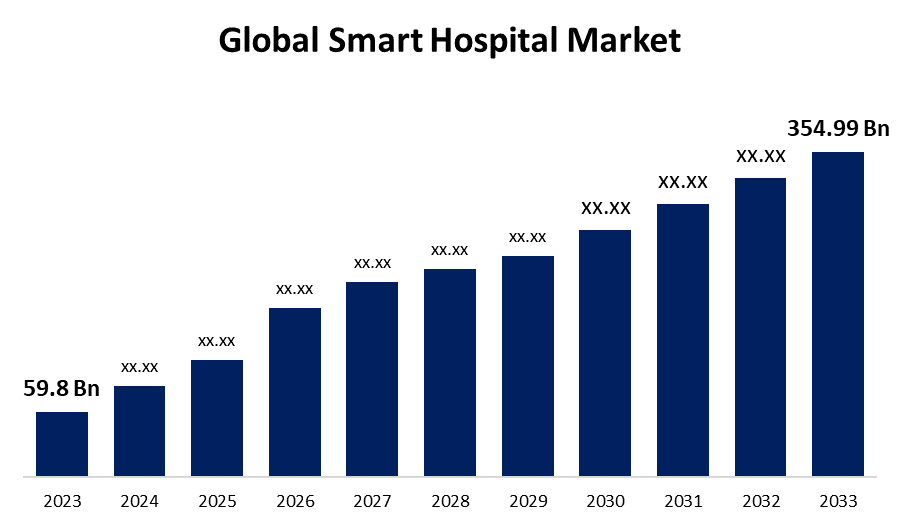Global Smart Hospital Market Size, Share, and COVID-19 Impact Analysis, By Component (Hardware, Software, and Services), By Technology (Cloud Computing, IoT, Artificial Intelligence, and Others), By Application (Electronic Health Record, Medical-Connected Imaging, Remote Patient Monitoring, Pharmacy Automation, Mobile Asset Tracking, and Other), and By Region (North America, Europe, Asia-Pacific, Latin America, Middle East, and Africa), Analysis and Forecast 2023 - 2033.
Industry: HealthcareGlobal Smart Hospital Market Insights Forecasts to 2033
- The Global Smart Hospital Market Size was Valued at USD 59.8 Billion in 2023
- The Market Size is Growing at a CAGR of 19.50% from 2023 to 2033
- The Worldwide Smart Hospital Market Size is Expected to Reach USD 354.99 Billion by 2033
- Aisa Pacific is Expected to Grow the fastest during the forecast period.

Get more details on this report -
The Global Smart Hospital Market Size is Anticipated to Exceed USD 354.99 Billion by 2033, Growing at a CAGR of 19.50% from 2023 to 2033.
Market Overview
A smart hospital refers to a healthcare facility that utilizes advanced technologies such as the Internet of Things (IoT), Artificial Intelligence (AI), big data analytics, and automation to improve patient care, enhance operational efficiency, and optimize the overall healthcare experience. It uses expensive gadgets and digital tools to enhance patient care, improve hospital operations, and make things operate smoothly. Smart hospitals integrate various digital systems and devices to collect, manage, and analyze data in real-time, enabling healthcare providers to make informed decisions and deliver personalized care to patients. These technologies can be applied across various aspects of hospital operations, including patient monitoring, diagnosis, treatment, resource management, and communication, with the ultimate goal of improving clinical outcomes, reducing costs, and enhancing patient satisfaction.
Report Coverage
This research report categorizes the market for the smart hospital market based on various segments and regions forecasts revenue growth and analyzes trends in each submarket. The report analyses the key growth drivers, opportunities, and challenges influencing the smart hospital market. Recent market developments and competitive strategies such as expansion, product launch, and development, partnership, merger, and acquisition have been included to draw the competitive landscape in the market. The report strategically identifies and profiles the key market players and analyses their core competencies in each sub-segment of the smart hospital market.
Global Smart Hospital Market Report Coverage
| Report Coverage | Details |
|---|---|
| Base Year: | 2023 |
| Market Size in 2023: | USD 59.8 Billion |
| Forecast Period: | 2023-2033 |
| Forecast Period CAGR 2023-2033 : | 19.50% |
| 2033 Value Projection: | to USD 354.99 Billion |
| Historical Data for: | 2019-2022 |
| No. of Pages: | 270 |
| Tables, Charts & Figures: | 110 |
| Segments covered: | By Component, By Technology, By Application, By Region |
| Companies covered:: | Siemens AG, Stanley Healthcare, Honeywell International Inc., Medtronic Plc., GE Healthcare, Koninklijke Philips N.V., Microsoft Corporation, Samsung Healthcare, Qualcomm Life, Philips, and Others |
| Pitfalls & Challenges: | Covid 19 Impact Challanges, Future, Growth and Analysis |
Get more details on this report -
Driving Factors
Several main factors drive the growth of the smart hospital market. Firstly, technical breakthroughs such as IoT, AI, and data analytics are revolutionizing healthcare delivery by allowing for real-time monitoring, tailored care, and operational efficiency. Second, the rising frequency of chronic diseases and an aging population are boosting demand for digital healthcare solutions such as remote monitoring, telemedicine, and personalized treatment regimens. Third, the need to contain rising healthcare costs is driving healthcare providers to invest in smart technologies that optimize resources and improve cost-effectiveness. Furthermore, government initiatives, regulatory frameworks, and the influence of events such as the COVID-19 pandemic are speeding up the implementation of digital healthcare technologies and driving a move toward patient-centric treatment.
Restraining Factors
The adoption of smart hospital technologies faces challenges such as high initial costs, concerns about data security, resistance to change among healthcare professionals and interoperability issues. Despite these obstacles, the benefits of enhanced patient care, operational efficiency, and cost-effectiveness drive the adoption of smart technologies in healthcare institutions. These considerations are especially important in poorer countries where resources might be sparse.
Market Segmentation
The smart hospital market share is classified into components, technology, and application
- The hardware segment dominates the market with the largest market share through the forecast period.
Based on the components, the smart hospital market is classified into hardware, software, and services. Among these, the hardware segment dominates the market with the largest market share through the forecast period. This dominance emphasizes the importance of hardware components in supporting the functionality and infrastructure of smart medical systems. Hardware, which includes sophisticated medical devices, integrated sensors, and networking equipment, serves as the foundation for smart hospital technology installations. Its significance is amplified by the critical function it plays in facilitating data capture, processing, and transmission in healthcare settings. As smart hospitals expand and integrate new technologies such as IoT, AI, and wearable devices, the need for innovative hardware solutions is likely to stay strong, maintaining the hardware segment's dominance in the worldwide smart hospital market.
- The IoT segment is anticipated to hold the largest revenue share through the projected period.
Based on the technology, the smart hospital market is categorized into cloud computing, IoT, artificial intelligence, and others. Among these, the IoT segment is anticipated to hold the largest revenue share through the projected period. This significance reflects the increasing use of IoT solutions in current healthcare settings, which allow for smooth communication and data sharing between medical devices, sensors, and systems inside smart hospital environments. Through real-time monitoring, remote patient management, and predictive analytics, IoT technologies enable healthcare facilities to improve patient care, maximize operational efficiency, and optimize resource use. With the ongoing progress of IoT platforms and the proliferation of linked medical equipment, the IoT segment is likely to maintain its leadership position in driving innovation and value creation within the worldwide smart hospital market.
- The medical-connected imaging segment is anticipated to grow at the fastest CAGR growth through the forecast period.
Based on the application, the smart hospital market is divided into electronic health records, medical-connected imaging, remote patient monitoring, pharmacy automation, mobile asset tracking, and others. Among these, the medical-connected imaging segment is anticipated to grow at the fastest CAGR growth through the forecast period. Medical-connected imaging includes modern modalities including digital radiography, PACS (Picture Archiving and Communication Systems), and telemedicine, which allow healthcare practitioners to easily gather, store, and share medical images and diagnostic data. These technologies make vital patient data available quickly, allowing for remote consultations, timely diagnosis, and better treatment planning. The significance of the Medical Connected Imaging Segment underscores the industry's acknowledgment of digital imaging's transformative impact on patient care, as well as its critical role in creating the future of smart hospitals.
Regional Segment Analysis of the Smart Hospital Market
- North America (U.S., Canada, Mexico)
- Europe (Germany, France, U.K., Italy, Spain, Rest of Europe)
- Asia-Pacific (China, Japan, India, Rest of APAC)
- South America (Brazil and the Rest of South America)
- The Middle East and Africa (UAE, South Africa, Rest of MEA)
North America is anticipated to hold the largest share of the smart hospital market over the predicted timeframe.

Get more details on this report -
North America is projected to hold the largest share of the smart hospital market over the forecast period. This estimate is based on a number of variables, including the region's excellent healthcare infrastructure, strong technological skills, and significant investments in healthcare IT systems. Furthermore, factors such as increased adoption of electronic health records (EHRs), government measures to encourage digital healthcare, and rising demand for remote patient monitoring and telemedicine services contribute to North America's dominance in the smart hospital market. Furthermore, the presence of important market players, extensive R&D efforts, and advantageous reimbursement policies all help to drive the region's smart hospital market expansion. As North America prioritizes healthcare digitization, interoperability, and patient-centered care delivery models, it is likely to maintain its leadership position in driving innovation and growth within the smart hospital market.
Asia Pacific is expected to grow at the fastest CAGR growth of the smart hospital market during the forecast period. Several reasons have contributed to this rapid expansion, including an increase in the prevalence of chronic diseases, rising healthcare costs, expanded access to healthcare services, and increased regional investments in healthcare infrastructure and technology. Furthermore, government measures to encourage digital healthcare, improved healthcare standards, and the use of sophisticated technologies such as IoT, artificial intelligence (AI), and cloud computing all contribute to the smart hospital market's rapid expansion in Asia Pacific. Furthermore, the region's vast population base, particularly in China and India, creates considerable market expansion prospects as healthcare providers seek creative solutions to meet their populations' changing healthcare needs.
Competitive Analysis:
The report offers the appropriate analysis of the key organizations/companies involved within the smart hospital market along with a comparative evaluation primarily based on their product offering, business overviews, geographic presence, enterprise strategies, segment market share, and SWOT analysis. The report also provides an elaborative analysis focusing on the current news and developments of the companies, which includes product development, innovations, joint ventures, partnerships, mergers & acquisitions, strategic alliances, and others. This allows for the evaluation of the overall competition within the market.
List of Key Companies
- Siemens AG
- Stanley Healthcare
- Honeywell International Inc.
- Medtronic Plc.
- GE Healthcare
- Koninklijke Philips N.V.
- Microsoft Corporation
- Samsung Healthcare
- Qualcomm Life
- Philips
- Others
Key Target Audience
- Market Players
- Investors
- End-users
- Government Authorities
- Consulting And Research Firm
- Venture capitalists
- Value-Added Resellers (VARs)
Recent Developments
- In September 2023, the government of Guntur launched a smart ICU at a primary healthcare center in Andra Pradesh, in collaboration with a corporate hospital, to provide advanced healthcare facilities in rural areas.
- In April 2023, Microsoft Corp. and Epic announced they are expanding their long-standing strategic partnership to develop and integrate generative AI into healthcare by combining the scale and capability of Azure OpenAI Service with Epic's industry-leading electronic health record (EHR) software.
Market Segment
This study forecasts revenue at global, regional, and country levels from 2023 to 2033. Spherical Insights has segmented the smart hospital market based on the below-mentioned segments:
Global Smart Hospital Market, By Component
- Hardware
- Software
- Services
Global Smart Hospital Market, By Technology
- Cloud Computing
- IoT
- Artificial Intelligence
- Others
Global Smart Hospital Market, By Application
- Electronic Health Record
- Medical-Connected Imaging
- Remote Patient Monitoring
- Pharmacy Automation
- Mobile Asset Tracking
- Other Applications
Global Smart Hospital Market, By Regional Analysis
- North America
- US
- Canada
- Mexico
- Europe
- Germany
- UK
- France
- Italy
- Spain
- Russia
- Rest of Europe
- Asia Pacific
- China
- Japan
- India
- South Korea
- Australia
- Rest of Asia Pacific
- South America
- Brazil
- Argentina
- Rest of South America
- Middle East & Africa
- UAE
- Saudi Arabia
- Qatar
- South Africa
- Rest of the Middle East & Africa
Frequently Asked Questions (FAQ)
-
1. What is the CAGR of the smart hospital market over the forecast period?The smart hospital market is projected to expand at a CAGR of 19.50% during the forecast period.
-
2. Which region holds the largest share of the smart hospital market?North America is anticipated to hold the largest share of the smart hospital market over the predicted timeframe.
Need help to buy this report?